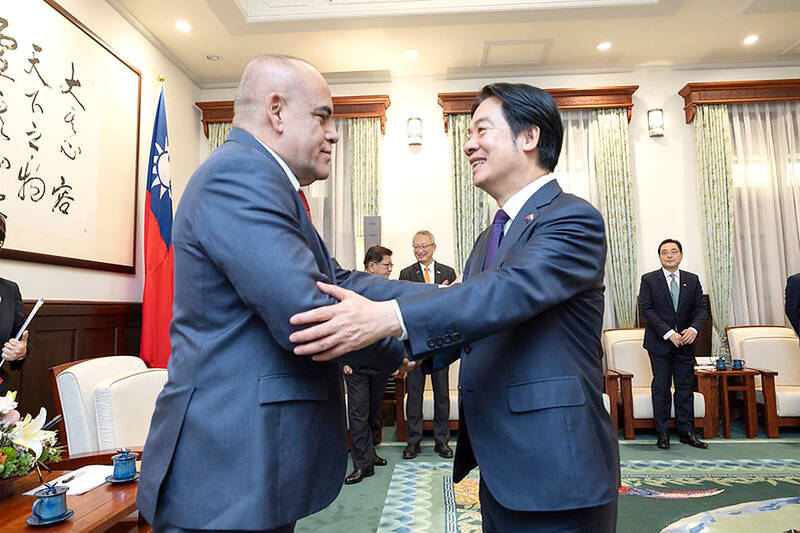President William Lai (賴清德) yesterday welcomed Paraguayan Senate President Basilio Gustavo Nunez Gimenez, who is visiting to bolster bilateral relations and deepen cooperation with Taiwan.
Nunez, who arrived with a delegation on Monday on a five-day visit, described Paraguay as “not only a friend, but also a partner,” and said his first trip to Taiwan after becoming Senate president in July was to reaffirm the South American nation’s commitment to bilateral ties.
Taiwan and Paraguay established formal relations in 1957. Paraguay is one of the 12 countries that diplomatically recognize Taiwan and Taiwan’s only ally in South America.

Photo: Screen grab from the Presidential Office’s Web site
At the meeting with Lai at the Presidential Office in Taipei, Nunez said Paraguay hoped to continue collaborating with Taiwan to bring prosperity to people from both countries and that the South American nation supports the right of countries to exercise freedom of navigation in the Taiwan Strait.
Paraguay also opposes any escalation of hostilities in the region, he said, while underscoring the importance of respecting the sovereignty of nations and upholding human rights.
Lai thanked Paraguayan President Santiago Pena and his government for supporting Taiwan’s bid to participate in the international community, most recently during the general debate of the UN General Assembly in late September.
Taiwan and Paraguay have achieved positive results from cooperation in areas such as education, healthcare, agriculture, infrastructure and women’s empowerment, Lai said, adding that his government looked forward to continuing working with Paraguay on mutually beneficial initiatives.
Also joining Nunez at the meeting were Paraguayan senators Derlis Hernan Maidana Zarza, Patrick Paul Kemper Thiede and Sergio Roberto Rojas Sosa, the Presidential Office said.
Separately, Taiwan and Paraguay have re- signed a Letter of Intent (LOI) to strengthen tourism cooperation, the Tourism Administration said in a statement issued yesterday.
The LOI was inked in Taipei on Monday by Tourism Administration Director-General Chou Yung-hui (周永暉) and his Paraguayan counterpart H.E. Angie Duarte de Mellilo, marking the first reconnection between the two sides on tourism matters since the COVID-19 pandemic, according to the Taiwan tourism agency.
Building on the framework set by the original LOI signed in 2018, Taiwan and Paraguay renewed the agreement, focusing on advancing digital, sustainable, and inclusive development in the tourism industry, the agency added.
The signing ceremony was witnessed by Paraguay’s Ambassador to the Republic of China (Taiwan), Carlos Fleitas.
Monday’s meeting was part of the itinerary for Duarte’s first trip to Taiwan. Her six-day visit, which began on Oct. 31, ended Tuesday.
During her time in Taiwan, she led a delegation of tourism officials to attend the 2024 Taipei International Travel Fair and visited the Sun Moon Lake National Scenic Area and National Taichung Theater, among other attractions.

DEFENDING DEMOCRACY: Taiwan shares the same values as those that fought in WWII, and nations must unite to halt the expansion of a new authoritarian bloc, Lai said The government yesterday held a commemoration ceremony for Victory in Europe (V-E) Day, joining the rest of the world for the first time to mark the anniversary of the end of World War II in Europe. Taiwan honoring V-E Day signifies “our growing connections with the international community,” President William Lai (賴清德) said at a reception in Taipei on the 80th anniversary of V-E Day. One of the major lessons of World War II is that “authoritarianism and aggression lead only to slaughter, tragedy and greater inequality,” Lai said. Even more importantly, the war also taught people that “those who cherish peace cannot

STEADFAST FRIEND: The bills encourage increased Taiwan-US engagement and address China’s distortion of UN Resolution 2758 to isolate Taiwan internationally The Presidential Office yesterday thanked the US House of Representatives for unanimously passing two Taiwan-related bills highlighting its solid support for Taiwan’s democracy and global participation, and for deepening bilateral relations. One of the bills, the Taiwan Assurance Implementation Act, requires the US Department of State to periodically review its guidelines for engagement with Taiwan, and report to the US Congress on the guidelines and plans to lift self-imposed limitations on US-Taiwan engagement. The other bill is the Taiwan International Solidarity Act, which clarifies that UN Resolution 2758 does not address the issue of the representation of Taiwan or its people in

Taiwanese Olympic badminton men’s doubles gold medalist Wang Chi-lin (王齊麟) and his new partner, Chiu Hsiang-chieh (邱相榤), clinched the men’s doubles title at the Yonex Taipei Open yesterday, becoming the second Taiwanese team to win a title in the tournament. Ranked 19th in the world, the Taiwanese duo defeated Kang Min-hyuk and Ki Dong-ju of South Korea 21-18, 21-15 in a pulsating 43-minute final to clinch their first doubles title after teaming up last year. Wang, the men’s doubles gold medalist at the 2020 and 2024 Olympics, partnered with Chiu in August last year after the retirement of his teammate Lee Yang

The Philippines yesterday criticized a “high-risk” maneuver by a Chinese vessel near the disputed Scarborough Shoal (Huangyan Island, 黃岩島) in a rare incident involving warships from the two navies. The Scarborough Shoal — a triangular chain of reefs and rocks in the contested South China Sea — has been a flash point between the countries since China seized it from the Philippines in 2012. Taiwan also claims the shoal. Monday’s encounter took place approximately 11.8 nautical miles (22km) southeast” of the Scarborough Shoal, the Philippine military said, during ongoing US-Philippine military exercises that Beijing has criticized as destabilizing. “The Chinese frigate BN 554 was